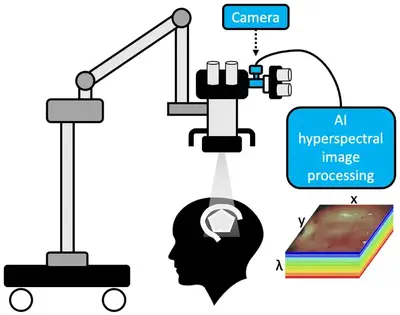Research Associate in "Computational Hyperspectral Imaging"
Post overview:
- Focus: Translational research on hyperspectral-based quantitative fluorescence imaging linked with a neurosurgery clinical study
- Line manager: Tom Vercauteren
- Clinical collaborator: King’s College Hospital
- Industry collaborator: Hypervision Surgical
- Salary: Grade 6, £38,826 - £45,649 per annum, including London Weighting Allowance

Job description
We are seeking an interventional image computing researcher to design and translate the next generation of AI-assisted hyperspectral imaging systems for surgical guidance using quantitative fluorescence. The postholder, based within the Department of Surgical & Interventional Engineering at King’s College London, will play a key role in a collaborative project with King’s College Hospital and work closely with the project’s industrial collaborator Hypervision Surgical, a recently founded King’s spin-out company. A clinical neurosurgery study has been set up to underpin this collaboration. The successful candidate will work on the resulting neurosurgical data as well as controlled phantom data. They will also have the opportunity to provide insight on how to best acquire prospective data.
Brain tumour surgery involves removing as much of the tumour as safely as possible. However, even with the best hands and the most modern technology currently available, it is often not possible to reliably identify tumour during surgery. Hyperspectral imaging (HSI) has the potential to enhance the surgeon’s vision to reliably identify tumour and healthy brain structures through the use of quantitative fluorescence. HSI data is nonetheless complex, high-dimensional and thus requires advanced computer-processing before it can be visualised and interpreted by the surgical team.
Key activities relate to the processing of hyperspectral imaging, from low-level image reconstruction to deep-learning based tissue property estimation and semantic segmentation of brain and tumour tissue. The recruited individual will complement our multidisciplinary team and undertake research on image computing, machine learning, and artificial intelligence for computer-assisted interventions.
The post involves close and active collaboration with researchers, engineers, and clinicians. Working with established platforms and building on the software already present within our teams is of paramount importance to ensure project cohesion and strong links with the members of the team. The close collaboration between King’s College London, King’s College Hospital and Hypervision Surgical Ltd will ensure a fast-tracked conversion from the research development into products achieving accelerated patient and public benefit.
The successful candidate will design, develop, and translate modular software components for hyperspectral image computing, machine learning and visualisation. They will also interface those with existing software and hardware components including the operative surgical microscope. Specifically, the candidate will develop algorithms for quantitative fluorescence estimation, super-resolution, tissue differentiation and informative visualisation. The candidate will work closely with the rest of the team to correlate the result of their work with rich clinical data (e.g. surgical microscopy, histopathology) and validate the overall imaging system.
This post will be offered on an a fixed-term contract for 3 years. This can be a full-time or part-time post, 50-100% full-time equivalent.
Key responsibilities
- Develop, validate and integrate real-time algorithms for interventional hyperspectral imaging
- Contribute to project management tasks
- Maintain accurate and up-to date technical and user documentation of the delivered software
- Contribute to the dissemination of the research through publications, open-source software and public engagement activities
The above list of responsibilities may not be exhaustive, and the post holder will be required to undertake such tasks and responsibilities as may reasonably be expected within the scope and grading of the post.
Skills, knowledge, and experience
Essential criteria
- Honours degree (2:1 or above) or equivalent in Mathematics, Engineering, Physics, Computer Science or related numerate discipline
- PhD or equivalent industrial experience in Computer Assisted Intervention or a closely related field
- Good knowledge of machine learning and computer vision algorithms
- Solid knowledge of and experience using the Python and C++ programming languages
- Experience with scientific software packages such as PyTorch, Pandas, SciPy, NumPy, SciKit’s, OpenCV, etc.
- Experience in standard software engineering practices including version control systems and software testing methodologies
- Experience working on system integration tasks
Desirable criteria
- A demonstrable record of publications in peer-reviewed conference proceedings and scientific journals
- Experience in real-time computing optimization (Parallel computing, GPGPU programming, deep learning inference engines such as TensorRT, etc.)
- Understanding of image acquisition and hardware components relevant to real-time data acquisition and processing of computational biophotonics
- Please note that this is a PhD level role but candidates who have submitted their thesis and are awaiting award of their PhDs will be considered. In these circumstances the appointment will be made at Grade 5, spine point 30 with the title of Research Assistant. Upon confirmation of the award of the PhD, the job title will become Research Associate and the salary will increase to Grade 6.
More information about the position and how to apply here or here.